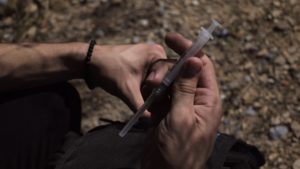Alcoholism and drug addiction ruin lives; this is true for every addict, no matter their circumstances or how severe their addiction is. However, stereotypes about addiction can lead to wrong thinking, such as assuming that substance abuse is always apparent. Santa Monica Christian Counseling offers support to help individuals understand and overcome addiction, providing a path to recovery and healing.
There’s a reason that addiction is often classified as a type of disease. Addiction has the three characteristics of a medical illness, which are:
- A set of particular symptoms.
- Progressive in nature.
- May eventually lead to death if untreated.
 While there are extreme forms of chemical dependency that lead to the loss of everything, the American Psychiatric Association’s manual, the DSM-5, quantifies symptoms in gradients of mild, moderate, and severe for Alcohol Use Disorder.
While there are extreme forms of chemical dependency that lead to the loss of everything, the American Psychiatric Association’s manual, the DSM-5, quantifies symptoms in gradients of mild, moderate, and severe for Alcohol Use Disorder.
Alcohol Use Disorder is the medical classification for alcoholism. The DSM-5, which is the manual for the American Psychiatric Association, classifies the symptoms into three levels: mild, moderate, and severe. When considering treatment, the ideal situation is to “catch” the addiction while it is still in the mild category. Early treatment can lessen the havoc wreaked by alcoholism.
Criteria to Diagnose Alcohol Use Disorder
This article will explore two main thoughts:
- What are the specific criteria used to identify Alcohol Use Disorder?
- What questions are asked in treatment to diagnose the disorder in an individual?
(Substance Abuse Disorder, which is related to Alcohol Use Disorder, can be identified and diagnosed by similar questions.)
As you read the treatment questions, you can consider how you or your loved one would answer them, and whether treatment might be needed.
The DSM-5 has provided a scoring system to rate each response. When at least two of the symptoms are present, these are the criteria that can identify Alcohol Use Disorder (AUD) and how severe it is. Two to three symptoms indicate mild AUD. Four to five symptoms indicate moderate AUD. And six or more symptoms indicate severe AUD.
11 Questions Your Chemical Dependency Counselor Might Ask
1) In the past year, have you had times when you ended up drinking more than you planned, or for a more extended period of time?
One of the stereotypes related to substance abuse is that if you can control your intake sometimes, you don’t have a severe problem. For example, a worker in corporate America manages his drinking well during four outings with his coworkers. But on the fifth outing, he drinks until he blacks out and has to call in sick the next day.
 Although he may write this incident off as no big deal, the unpredictability of his loss of control suggests a serious issue. It’s not how frequently he loses control; it’s that he can’t predict when it will happen.
Although he may write this incident off as no big deal, the unpredictability of his loss of control suggests a serious issue. It’s not how frequently he loses control; it’s that he can’t predict when it will happen.
2) In the past year, have you more than once wanted to reduce your alcohol intake or stop it altogether, but were unable to? Or have you made unsuccessful attempts to cut back or quit?
One of the hallmarks of addiction is an inability to stop the behavior on your own. In recovery circles, people sometimes share a quote that says, “Once you become a pickle you can’t go back to being a cucumber.” Once you’ve lost the ability to manage your alcohol intake, that control is gone forever.
This holds true even if you try to manage your addiction by switching substances. You’ve still lost control over your choices, no matter what the substance is. But if you realize this, you’re already taking a step toward positive change. The more you recognize your inability to stop and how it’s affecting your life, the more likely you are to seek help and recover.
3) Do you spend an excessive amount of time obtaining alcohol, drinking it, and recovering from drinking?
The Russian scientist Pavlov performed a famous experiment where he associated the ringing of a bell with serving food to dogs. Eventually, the dogs salivated on their own every time they heard the bell ring, even without food being there.
This experiment sheds light on the nature of addiction. The high of drinking alcohol is a stimulus to brain chemicals. Eventually, anything associated with the high causes anticipation. Life begins to revolve around planning to drink and then the drinking itself. Any person, place, or situation associated with alcohol reinforces the addiction cycle.
This is why one of the first steps in recovery is to break associations with the people or environments that encourage you to drink. Individuals who do not want to remove these associations rarely succeed in recovery.
4) In the past year, has much of your time been spent drinking or being hungover?
Substance abuse isn’t just about the substance itself. Instead, it becomes an intricate system of expectations and rewards. The addiction hijacks an individual’s natural reward system in their brain. Their focus and daily goals shift to achieving the next high rather than pursuing healthier rewards in work, relationships, and hobbies.
Sooner or later, the majority of an addict’s time and energy is devoted to achieving the next high. Inevitably, other aspects of life deteriorate, whether that be work, school, family, friends, emotions, or other areas. The addict loses his or her ability to find satisfaction and pleasure in the comparatively unexciting activities of daily life.
This disinterest in daily life becomes a self-perpetuating cycle, as it compels the addict to focus even more on drinking as an escape.
5) In the past year, have drinking and hangovers interfered with your responsibilities at home, school, or work?
Most addicts don’t seek treatment because they actually want to stop drinking; instead, they desire to ameliorate the adverse effects of drinking on other aspects of their lives.
Maybe it’s a threatened job loss or divorce or some other catastrophic incident that has opened their eyes to the severity of the problem.
Treatment for addiction is, by necessity, an intense confrontation of the problem. For recovery to be possible, the addict has to realize that the issues in their life are not soothed by drinking, but created or worsened by drinking.
 Other people are not causing the alcoholism, and circumstances are not causing it. The addict has to acknowledge that drinking is a destructive coping mechanism and must take personal responsibility for their decision to drink.
Other people are not causing the alcoholism, and circumstances are not causing it. The addict has to acknowledge that drinking is a destructive coping mechanism and must take personal responsibility for their decision to drink.
6) In the past year, have you continued to drink even when it caused problems in your relationships?
Denial is one of the most potent mental defenses we humans have when something is going wrong in our lives (this is why denial is generally the first stage of grief). In addiction, denial is devastating. It keeps the addict from owning the problem. Addicts who’ve experienced severe consequences such as DUIs, lost jobs, or divorce still may deny, even to themselves, that they have a problem.
If the people around the addict stop enabling the behavior, the addict may be able to begin to recognize what’s going on and have their denial unquestionably confronted.
7) In the past year, have you cut back on or stopped doing activities you previously enjoyed because you wanted to drink instead?
As addiction hijacks the brain’s reward system, it makes every other activity pale in comparison to using the substance. One method of treatment is to have the addict write a farewell letter to the addiction. Reading these letters gives amazing insight into the relationship an addict has to their substance of choice. Addicts have described their favorite drug as a lover, companion, comforter, or best friend.
When someone has been an addict for years, learning how to find satisfaction in a normal, healthy lifestyle can be a huge learning curve. Twelve-step programs offer hope as recovered addicts share how they enjoy life without using substances.
8) In the past year, has your substance use put you in harm’s way (such as while driving, walking, swimming, or having unsafe sex)?
Alcohol is a central nervous system depressant that directly crosses the blood/brain barrier, affecting a person’s ability to think when drunk. The prefrontal cortex is the part of our brain associated with thinking, planning, and judgment.
Alcohol is a depressant that affects the central nervous system. It directly crosses the barrier between the blood and brain, having drastic impacts on cognitive ability.
In our brains, the prefrontal cortex is the part that thinks, judges, and plans. Alcohol silences the brain’s voice of judgment, raising the likelihood of risky choices. The statistics on emergency room visits are enlightening; a vast number are linked to alcohol abuse, and the number is continuing to rise.
9) In the past year, have you continued to drink even though it made a health problem worse or increased your depression or anxiety? Or have you continued to drink even after experiencing one or more blackouts?
 You’re probably familiar with a simplified definition for insanity: “Doing the same thing over and over while expecting different results.” This is relevant to addiction because alcoholism does not arise from a rational series of decisions. An addict may hope to achieve the positive results they associate with their early substance use, or they just want to feel normal, and the only way they can now is to drink.
You’re probably familiar with a simplified definition for insanity: “Doing the same thing over and over while expecting different results.” This is relevant to addiction because alcoholism does not arise from a rational series of decisions. An addict may hope to achieve the positive results they associate with their early substance use, or they just want to feel normal, and the only way they can now is to drink.
Some addicts have accepted the reality that they can no longer control their drinking, but they have come to terms with the fact that alcohol will eventually kill them. From an outsider’s perspective, continuing to drink even though it’s ruining your life is insane, but once you’re trapped in a cycle of addiction, you’ve lost the ability to make well-reasoned choices about substance use.
10) In the past year, have you had to drink more to feel the same effect you used to feel?
Chemical dependency is based on tolerance. The body naturally adjusts to chronic substance use by not producing the chemical provided by the substance. The body then depends on the substance to feel “normal.” And over time, the need for the substance increases to create the same effect.
In the beginning, a person might feel relaxed after drinking a single alcoholic beverage. If they drink every day, though, their body will adjust, and they’ll need to drink four or five beverages to achieve the same feeling. Building up a tolerance to the substance is a symptom of a progressing addiction.
11) In the past year, have you experienced withdrawal symptoms as the alcohol wears off, such as insomnia, restlessness, nausea, sweating, shaking, rapid heart rate, seizures, or hallucinations?
When someone is chemically dependent on a substance, their entire nervous system needs it to function. When the substance is not available, standard physical processes no longer work. Thus, stopping the daily consumption of a substance causes physical withdrawal symptoms.
GABA is a neurotransmitter in the brain that’s associated with relaxation and slowing down. If the brain were a car, GABA is the brakes. Alcohol significantly affects GABA levels, and over time the brain can stop producing it altogether. When the alcohol is removed, electric signals overwhelm the mind and GABA isn’t there to slow it down.
This is why if you’re addicted to alcohol, cutting it off can be dangerous or even life-threatening. Supervised withdrawal is recommended to prevent seizures or other harmful side effects.
The above questions are the criteria used by the American Psychiatric Association to diagnose Alcohol Abuse Disorder. Getting a loved one or family member who needs help to enter treatment with a chemical dependency counselor can be a thorny issue.
If you’re trying to encourage someone you love to seek treatment for their addiction, it’s important to start by setting boundaries and withdrawing any support you’ve provided that allows the habit to continue.
Even if your loved one doesn’t seek treatment for themselves from a chemical dependency counselor, you can speak with a mental health professional who’s experienced in addiction treatment and intervention. This can help you break patterns of codependency, set healthy boundaries, and make difficult decisions about how to handle your loved one’s addiction.
If you’re reading this article and you meet the criteria for a problem as described above, do yourself the favor of getting professional help. Often, the first step of asking for help is the hardest part of getting better.
If you are the one struggling with an addiction based on the criteria above, don’t hesitate to seek professional help. There is hope. Many addicts recover and go on to live fulfilling lives. Working with a chemical dependency counselor to develop a treatment plan provides support as you journey through the recovery process.
You’ll receive counseling, medical treatment, and the opportunity to be involved in a support group, family therapy, peer mentoring, and more. Call today to take the first step toward hope with a counselor at Santa Monica Christian Counseling.
“Toxic Injection”, Courtesy of Jair Lazaro, Unsplash.com; CC0 License; “Party Girls”, Courtesy of Michael Discenza, Unsplash.com, CC0 License; “Drunk”, Courtesy of Thom Mascat, Unsplash.com, CC0 License; “Decisions”, Courtesy of Brandy Turner, Unsplash.com, CC0 License


